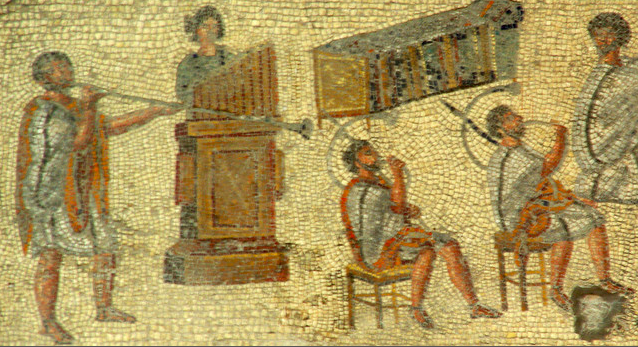

The power and influence of the Roman Empire spread through the effectiveness of its military apparatus, and the effectiveness of that apparatus lay in its discipline, organization, and logistical prowess. Other than perhaps using brass instruments like the tuba and cornua to transmit basic commands across the battlefield, Roman armies began their battles in silence so that everyone could properly hear and understand their orders. A certain tone of amused condescension, however, can be heard as the Romans wrote about the use of music among their enemies.
…the Parthians do not encourage themselves to war with cornets and trumpets, but with a kind of kettledrum, which they strike all at once in various quarters. With these they make a dead, hollow noise, like the bellowing of beasts, mixed with sounds resembling thunder, having, it would seem, very correctly observed that of all our senses, hearing most confounds and disorders us, and that the feelings excited through it most quickly disturb and most entirely overpower the understanding.” - Plutarch, The Life of Crassus
Indeed, I have observed that even the Barbarians across the Rhine sing savage songs composed in language not unlike the croaking of harsh-voiced birds, and that they delight in such songs. For I think it is always the case that inferior musicians, though they annoy their audiences, give very great pleasure to themselves." - Emperor Julian
Off the battlefield, however, Roman music was similar to Greek music, and it was considered quite prestigious to study music with a Greek tutor. Instrumental music in particular would be used at festivals, weddings, and funerals. In addition to brass, the Romans had woodwind instruments like the tibia and stringed instruments including the cithara and lyra. A form of the bagpipe was also known to them, as well as numerous types of bells and percussion instruments. The hydraulis, a water-powered organ, could sometimes be found in the homes of the very wealthy.
Nothing gains an influence so easily over youthful and impressionable minds as the various notes of song, the greatness of whose power both for good and evil can hardly be set forth in words. For it arouses the languid, and calms the excited; now it restrains our desires, now gives them free rein." - Marcus Tullius Cicero
Lyra and Cithara
Bacchus
Magna Mater